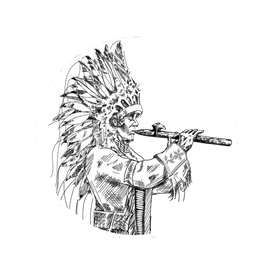For Dennis Ross, making Kachina dolls is a family business. Seven years ago he was working in Phoenix, as a steel worker. In his spare time he made a Kachina doll and then took it to an art gallery to see if they would be interested in buying it. He was surprised to find that they not only bought it, they paid him double what he usually got on his paycheck from work! Over the next six months, Dennis carved dolls in the evening, and on weekends, keeping his day job, and then, with his wife's approval, he quit working on construction. Together they began making dolls full time.
"I don't have a hard time selling my work," Dennis says, and he only remembers one time when he felt he was underpaid for a piece.
The reason for Dennis's success is the high quality of work he produces. His dolls are outstanding for several reasons. First of all, Dennis loves what he is doing. It allows him to be home with his wife and young son and daughter, and he enjoys that. He also enjoys being financially independent and free to set his own schedule.
The Hopi Kachina dolls are part of Dennis's heritage, his father being Hopi. Dennis's mother is Navajo, and Dennis thinks about making Navajo figures, especially since his wife, Harriet, is Navajo. Dennis says Harriet gives him his greatest encouragement, as well as doing most of the sanding and paint work. "She's good with her hands", he praises her, "We help each other out."
Wherever Dennis goes, whatever he does, his mind is not far from his art. He is constantly trying to improve on his technique. He observes people, their posture and body language, thinking about how he can make his still life figures look more animated.




